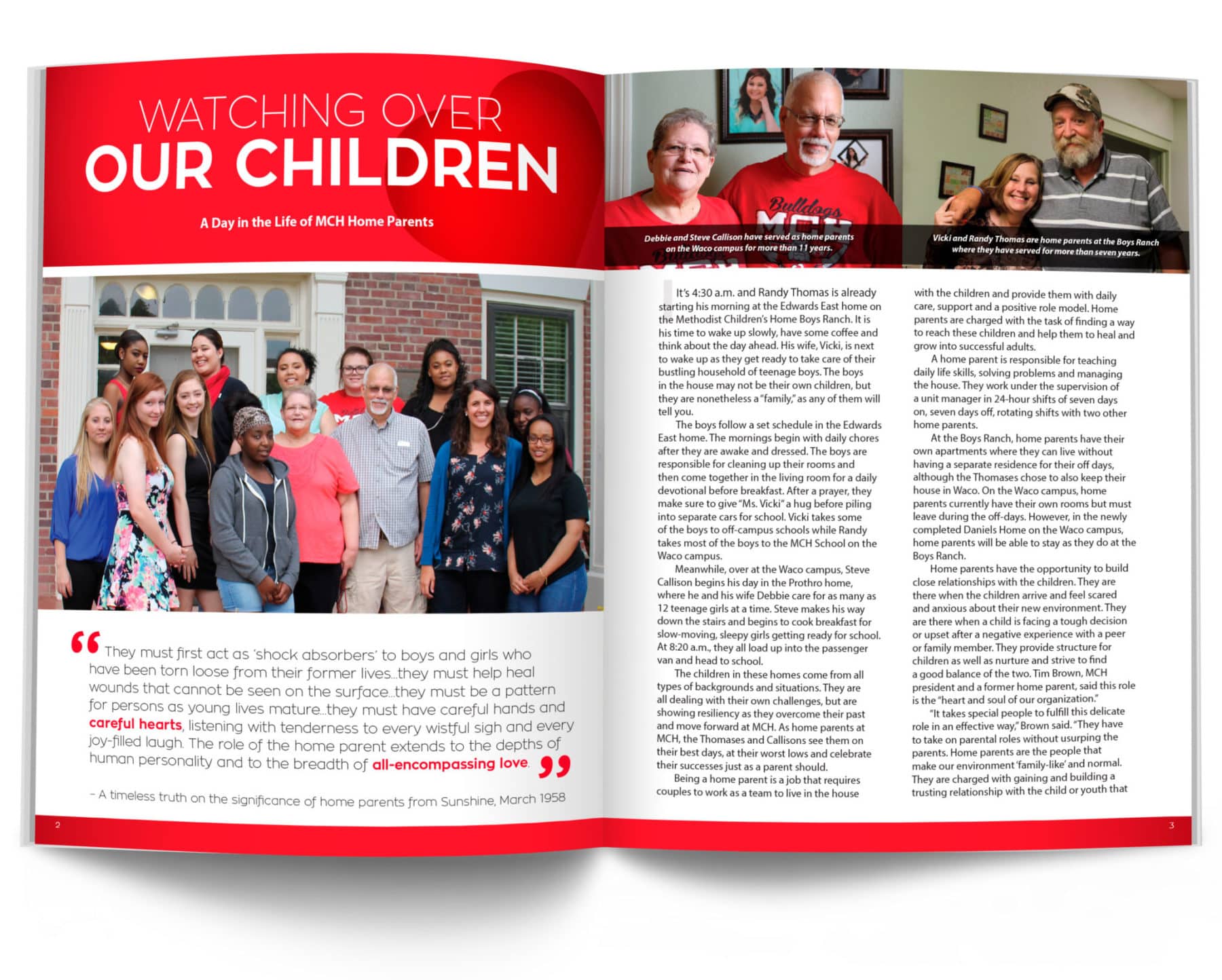
A Day in the Life of MCH Home Parents
They must first act as ‘shock absorbers’ to boys and girls who have been torn loose from their former lives…they must help heal wounds that cannot be seen on the surface…they must be a pattern for persons as young lives mature…they must have careful hands and careful hearts, listening with tenderness to every wistful sigh and every joy-filled laugh. The role of the home parent extends to the depths of human personality and to the breadth of all-encompassing love.
-A timeless truth on the significance of home parents from Sunshine, March 1958
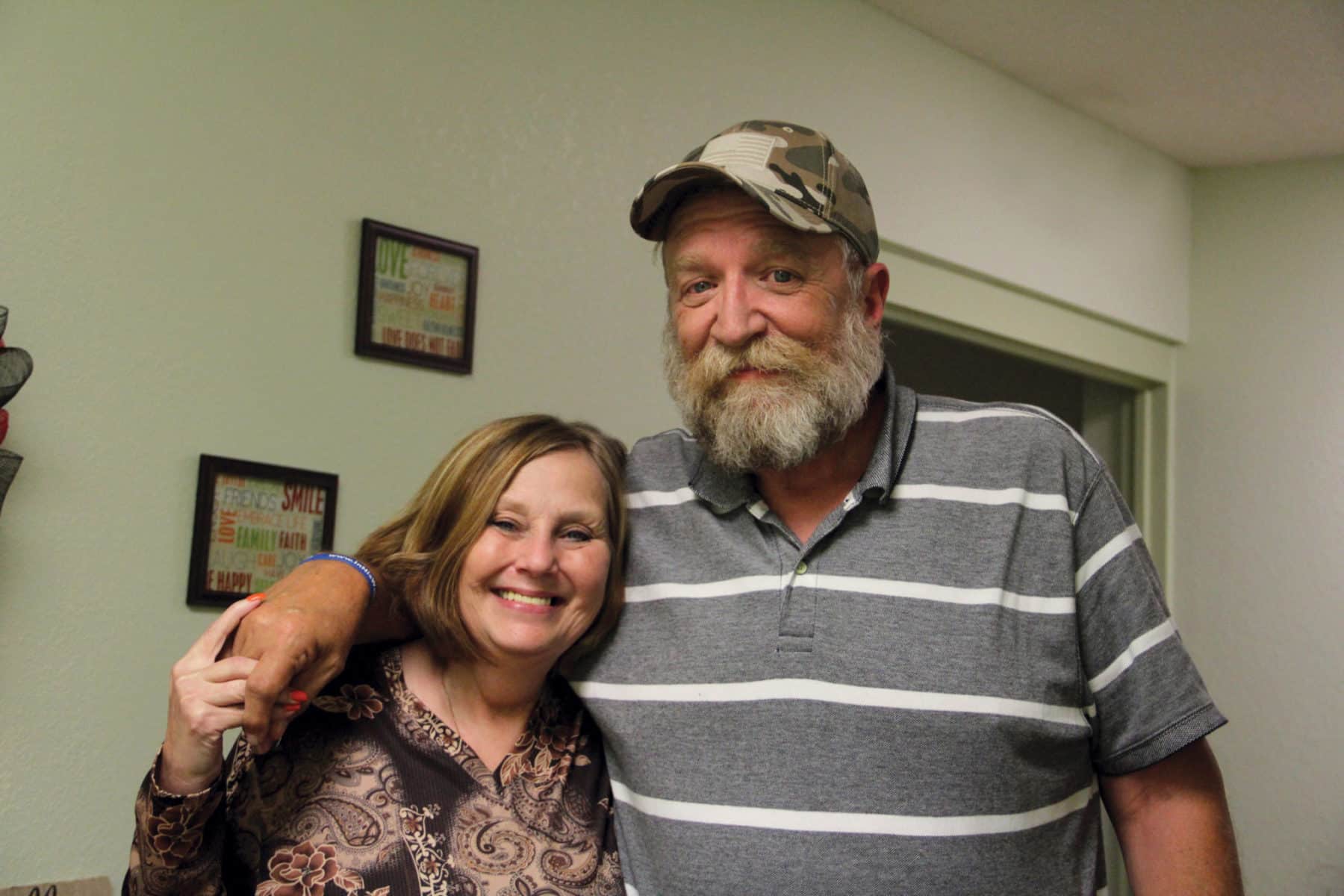
It’s 4:30 a.m. and Randy Thomas is already starting his morning at the Edwards East home on the Methodist Children’s Home Boys Ranch. It is his time to wake up slowly, have some coffee and think about the day ahead. His wife, Vicki, is next to wake up as they get ready to take care of their bustling household of teenage boys. The boys in the house may not be their own children, but they are nonetheless a “family,” as any of them will tell you.
The boys follow a set schedule in the Edwards East home. The mornings begin with daily chores after they are awake and dressed. The boys are responsible for cleaning up their rooms and then come together in the living room for a daily devotional before breakfast. After a prayer, they make sure to give “Ms. Vicki” a hug before piling into separate cars for school. Vicki takes some of the boys to off-campus schools while Randy takes most of the boys to the MCH School on the Waco campus.
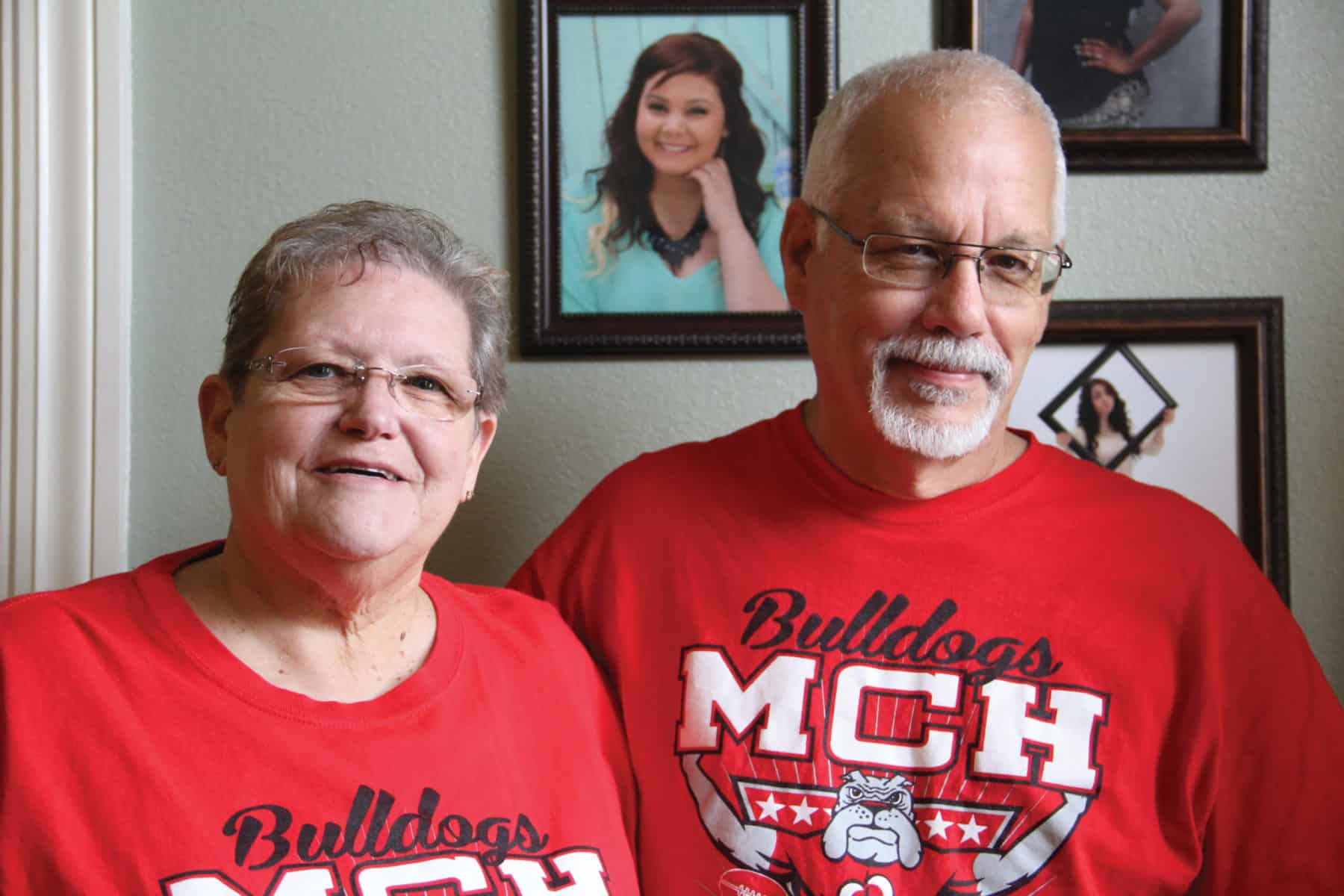
Meanwhile, over at the Waco campus, Steve Callison begins his day in the Prothro home, where he and his wife Debbie care for as many as 12 teenage girls at a time. Steve makes his way down the stairs and begins to cook breakfast for slow-moving, sleepy girls getting ready for school. At 8:20 a.m., they all load up into the passenger van and head to school.
The children in these homes come from all types of backgrounds and situations. They are all dealing with their own challenges, but are showing resiliency as they overcome their past and move forward at MCH. As home parents at MCH, the Thomases and Callisons see them on their best days, at their worst lows and celebrate their successes just as a parent should.
Being a home parent is a job that requires couples to work as a team to live in the house with the children and provide them with daily care, support and a positive role model. Home parents are charged with the task of finding a way to reach these children and help them to heal and grow into successful adults.
A home parent is responsible for teaching daily life skills, solving problems and managing the house. They work under the supervision of a unit manager in 24-hour shifts of seven days on, seven days off, rotating shifts with two other home parents.
At the Boys Ranch, home parents have their own apartments where they can live without having a separate residence for their off days, although the Thomases chose to also keep their house in Waco. On the Waco campus, home parents currently have their own rooms but must leave during the off-days. However, in the newly completed Daniels Home on the Waco campus, home parents will be able to stay as they do at the Boys Ranch.
Home parents have the opportunity to build close relationships with the children. They are there when the children arrive and feel scared and anxious about their new environment. They are there when a child is facing a tough decision or upset after a negative experience with a peer or family member. They provide structure for children as well as nurture and strive to find a good balance of the two. Tim Brown, MCH president and a former home parent, said this role is the “heart and soul of our organization.”
“It takes special people to fulfill this delicate role in an effective way,” Brown said. “They have to take on parental roles without usurping the parents. Home parents are the people that make our environment ‘family-like’ and normal. They are charged with gaining and building a trusting relationship with the child or youth that allows that trust to be passed on to other staff throughout the organization. They need to have the ability to offer safety and support as well as predictability, firmness and fairness in their interactions with each student in their care.”
The Call to Serve
The Thomases have been home parents at the Boys Ranch for more than seven years. Married for 13 years, they have two daughters and six grandchildren. Before MCH, Randy worked at the juvenile detention center while Vicki worked in customer service.
Their family had struggles in the past, and Vicki recalls God leading them through the challenges and giving them a desire to serve in a new way. One day, Randy was looking through the paper and saw an ad for home parents at another childcare institution. Two weeks after applying they were hired and moving out of town along with their two daughters.
“We felt there was more God wanted us to do,” Vicki said. “God was telling me, ‘I saved your children. Now it’s time for you to help some of mine.’ It is my calling.”
When their grandson began having medical issues and needed to be closer to the children’s hospital in the Dallas/Fort Worth area, the family decided it was time to head back home. It was through this change that the Thomases eventually found a new place to serve out their calling through Methodist Children’s Home.
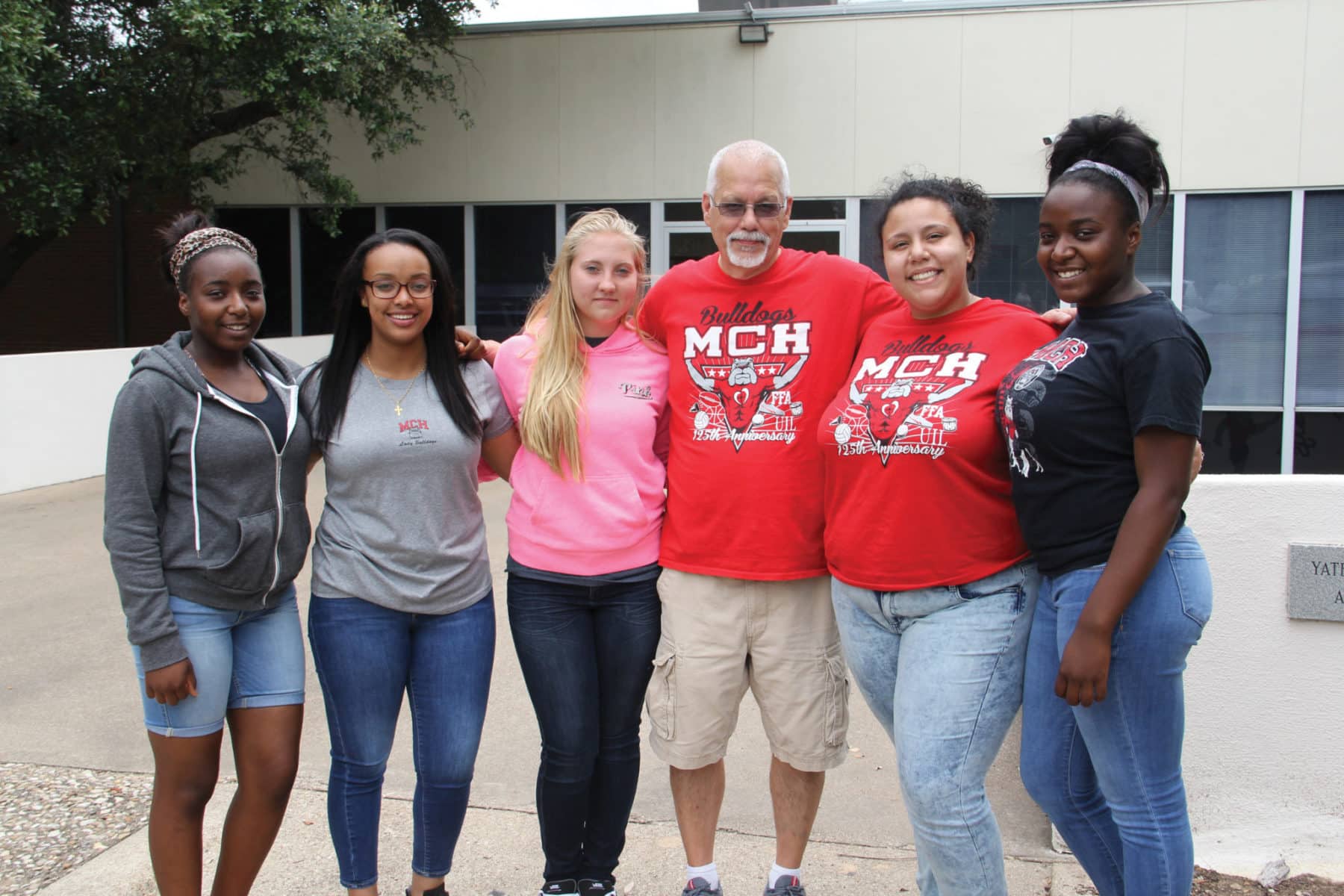
The Callisons have been home parents at MCH for more than 11 years. Debbie was very familiar with the ministry because her grandparents also served as home parents, and she spent a lot of time on the campus as a child. The couple has two sons and a daughter and four grandchildren.
Before MCH, Steve was working 80 hours a week in the auto parts industry while Debbie worked in a quilt shop. They rarely saw each other due to their schedules and one day Debbie decided they needed a change.
“It’s like something just said, you need to go there,” Debbie said.
They filled out an application with MCH and two weeks later they were working in a home on the Waco campus. They were first assigned to a boys home and also served at a transitional living house for girls before landing at Prothro, where they have been ever since.
Building a Nurturing Home
The job of a home parent is similar to the role of a regular parent. While there may be an enjoyable silence in the home after the children leave for school, throughout the day home parents may need to run a child to a doctor’s appointment, talk to the school about any issues, run errands for the house or care for a sick child. Once the children are out of school, home parents provide transportation for youth who have jobs off-campus, athletic practice, cheerleading or other extracurricular activities. They are also responsible for taking the children shopping and planning group outings for dinners, theme parks, or other fun events.
The youth come together for dinner around the dining table at Prothro and in the dining hall at the Boys Ranch. After dinner is “down time” when everyone can watch television, focus on their studies, play games, hang out in their rooms or complete their chores before bedtime.
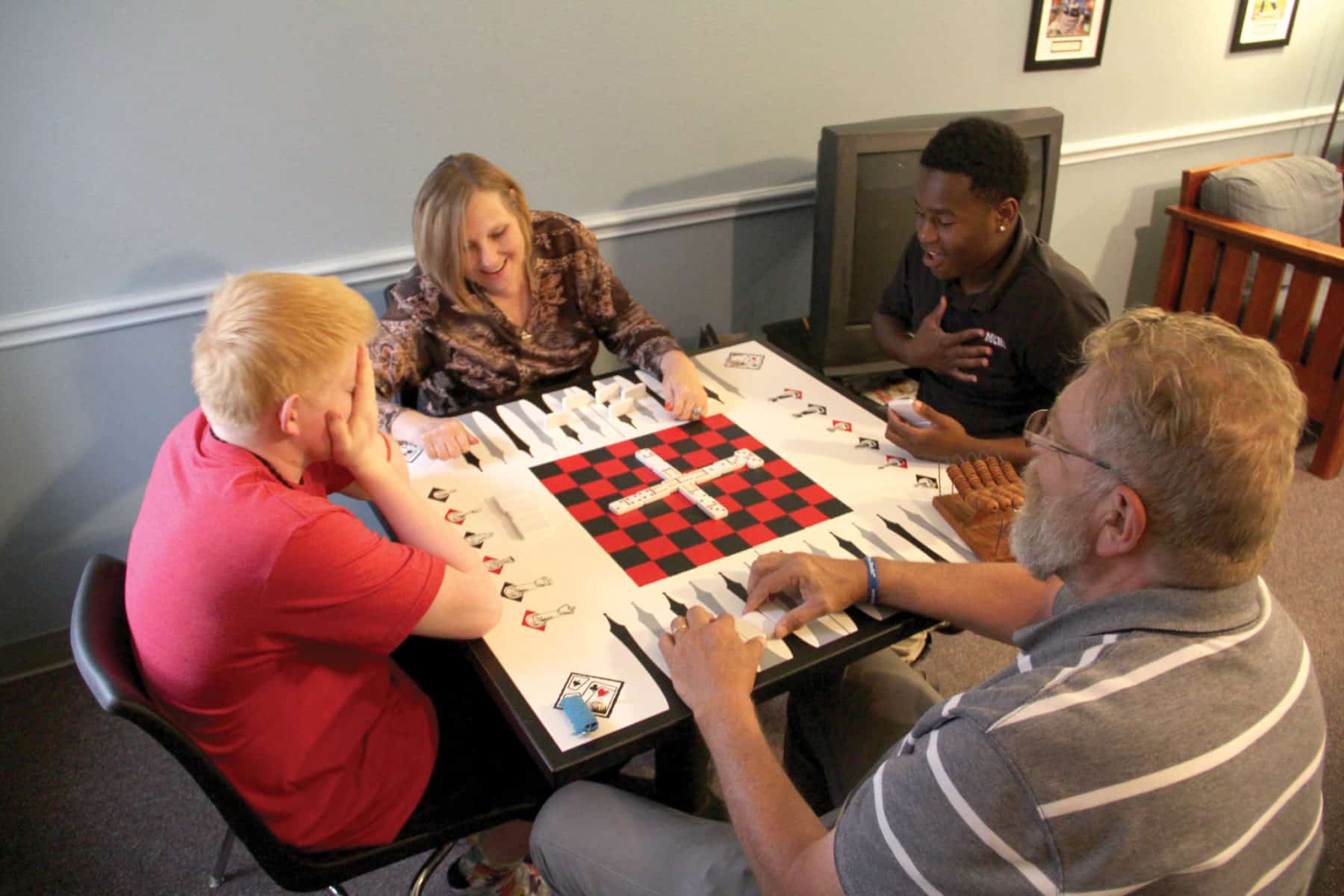
Throughout the comings and goings of the day, the Callisons and Thomases find ways to build relationships with the children in their home. The couples share a common philosophy on how to start out their relationships with their children when they first enter the house.
“Everyone comes in with a clean slate,” Vicki said. “We will let go of the past and move forward. This is your present and your future.”
The Thomases feel that giving everyone a fresh start and letting them know right away what their expectations are has helped them to run an effective, loving home.
“We tell them you are going to grow into a productive, successful man,” Vicki said. “By the time you leave, you will have character and carry yourself with pride. We do not disrespect in this house, whether it is with staff, peers or out in the world. If you continue to give respect, you will get it back.”
Miranda Traylor, unit manager for the Edwards East home, said the Thomases have helped to provide a stable environment for the boys at the Ranch.
“The Thomases have been essential in helping maintain structure, setting expectations and providing supervision to the boys in their home,” she said. “They have worked to build strong relationships with them and strive to teach the boys the lessons necessary for them to reach their full potential.
“The Thomases are valued home parents and I appreciate all of their hard work and effort to make our boys successful,” she added.
The Callisons also believe strongly in a “fresh start” for the youth in their care. They said they have learned to deal with some of the more challenging behaviors and found a way to connect with several girls who were moved to their home from other homes on campus.
“I don’t want to have a preconceived notion about what somebody else thinks this child is like,” Debbie said. “We want to form our own opinion.”
“We’re not going to take any of these kids that come to us and try to make them something they’re not,” Steve said. “We’re going to accept them for who they are no matter what they’ve done in the past.”
Lasting Lessons
The Callisons feel they have been successful in building relationships due to their ability to give the girls a voice. When there are conflicts or someone breaks the rules, the Callisons will try to determine why the child did what they did and feel that using the incident as a teaching moment is more valuable than handing out threats or punishment.
“It gives us an opportunity when we have issues to show them the proper way to handle it,” Steve said. “Most kids don’t have adults who will teach them the right thing. A lot of people may want to blame the kids, but they just don’t know how to handle things.”
“Ninety percent of the kids we deal with are here for reasons that aren’t their fault,” Debbie added. “You have to respect them before they will respect you.”
She said it is also crucial to have a foundation of trust with the girls in order for them to feel comfortable coming to you for help.
“We try to be as open and honest as we can because so many of them have been lied to enough in their life,” she explained. “I try to be as straightforward as I can be. We want them to know we’ll be honest with them.”
Steve and Debbie want the girls to come and talk to them about their issues. They make a point to talk to each girl at some point in the day. Steve also realizes he fills a special role in the house as a male role model that many of the girls don’t have in their family lives.
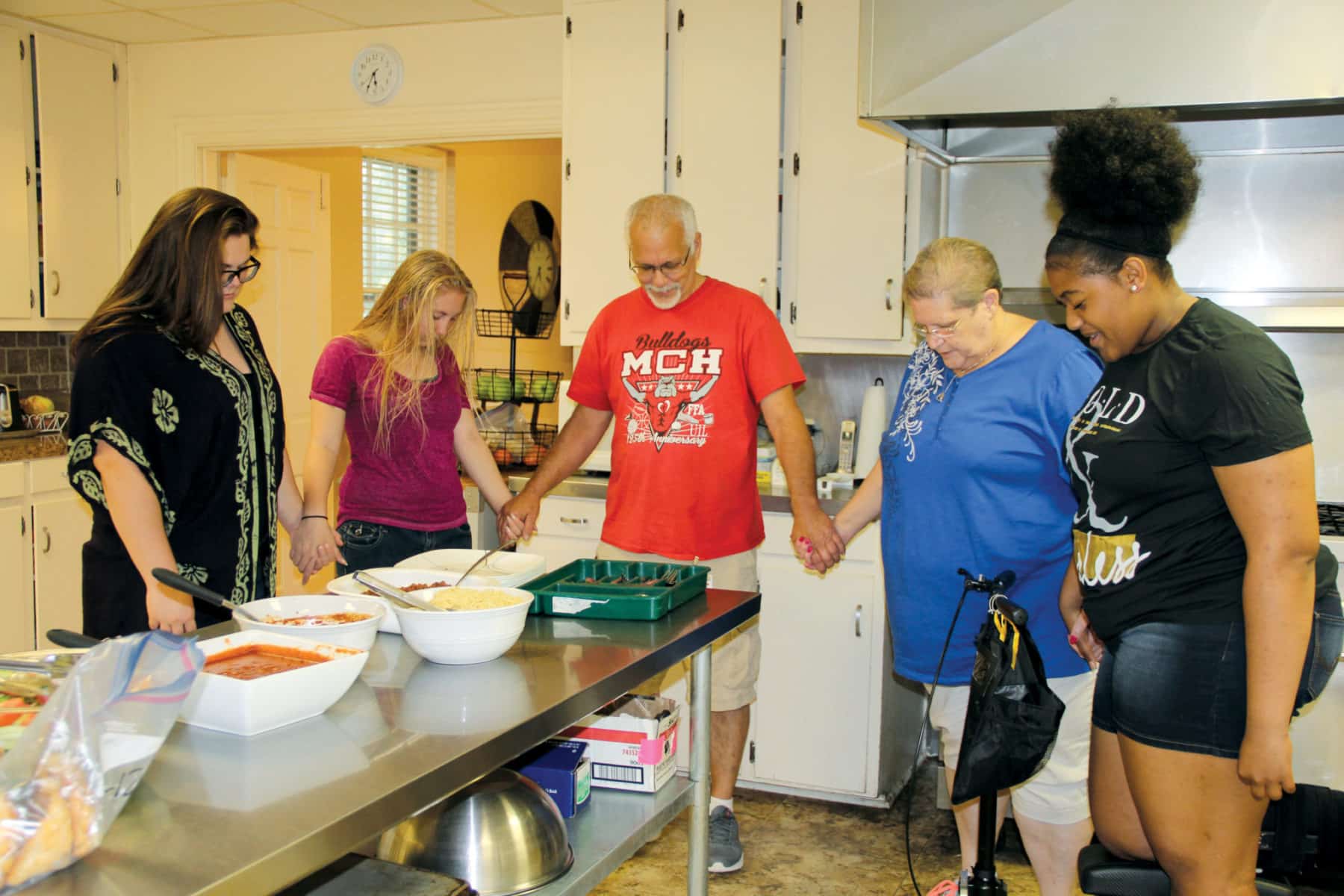
In relating to the girls in their care, Steve noted, “If you can’t be strong and loving, you can’t do this job.”
He said Debbie also provides the girls with a strong female role model by showing leadership at the house.
“That’s what we want these girls to be like when they leave here,” he said. “We don’t want them to be run over. We want them to be in charge of their lives because so many of them have been run over before they got here.”
Debbie continued, “We want them to see that it is OK to be independent. It’s OK to stand up to someone. You don’t have to be hit on. You don’t have to be walked on. You don’t have to be used and abused. That’s not the way your life has to be. It’s OK to stand up.”
In addition to respect and discipline, home parents also model healthy marriage relationships for the youth.
“As a home parent couple, you need to be comfortable with each other and have the ability to communicate differences with each other in private and allow children to see you as a couple as well as an individual,” Brown said. “They need to see you share responsibilities, work out a division of labor, love and respect each other without being too personal about your own issues or relationship with each other.”
The girls in Prothro feel close to the Callisons and have responded well to their example.
“They feel more like parents than staff,” said Rumor, a resident since April 2016.
“It feels like we’re a family,” said Sky, a resident since March 2016. “I’ve learned what real parents are supposed to look like.”
Bethany Parrott, unit manager for the Prothro home, said she feels blessed to have the Callisons in her home and said each makes a special effort to connect with the girls.
“Steve and Debbie are loyal home parents who see their role as an opportunity to change lives,” she said. “They use their individual gifts to make the house feel like a home and provide each student with a sense that they are part of a family. They put in the extra effort to develop a relationship with each child on campus and truly treat the girls in their house as if they were their own children. Together Debbie and Steve are positive role models who instill hope into each youth that comes into their care.”
The Thomases also do their best to prepare the boys for the outside world by helping them to learn from mistakes and deal with their feelings. Vicki said she strives to pay attention to the boys’ moods and seek them out if they seem as if something is bothering them.
“We teach them that it is OK to share emotions and it’s OK to cry,” she said. “If we let our emotions out that way, we are less likely to let them out with our fists.”
Na’Keldrick, a resident at the Boys Ranch since 2015, said he had anger issues before coming to MCH and got into a lot of fights. When his mother passed away, his anger got worse and he said he began hanging out with a bad crowd. But he began to build a strong relationship with the Thomases and has become a leader in the house.
“They are like family. They have brought me a long way,” he said. “Ms. Vicki makes me talk. She taught me to let go and to not hold a grudge.”
The Thomases also inspire a spiritual foundation for the boys and encourage them to participate in mission trips and camps during the summer. They hope it leads to a strong faith they can carry with them when they leave.
“I try to prepare them to be out there and be successful, to have jobs, respect and life skills,” Randy said. “I try to also teach them their lives will be better with God, to accept Him and let Him be there for you.”
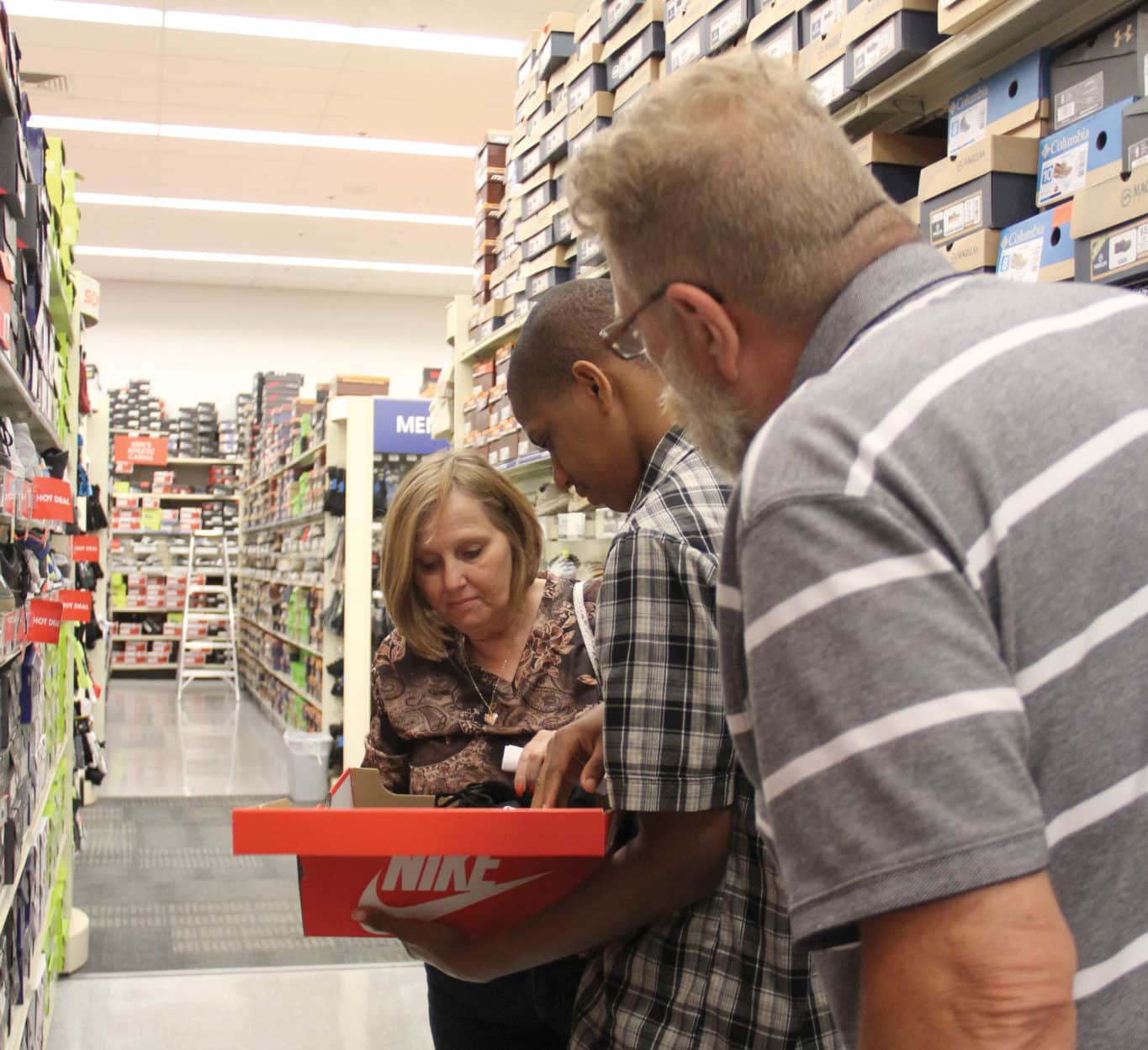
The house started a prayer circle each night before bed where the boys are welcome to join in or sit close by to listen. This effort has had a strong impact on several of the boys who did not previously have a relationship with God.
Jose, a resident since March 2016, came to MCH after having trouble with the law. He was a gang member and spent most of his time on the streets. After expressing his desire to change, he came to MCH.
“The first couple of days were hard,” he said. “I wasn’t used to the environment and I had an anxiety attack.” Vicki prayed with Jose and helped him through that time and soon after he joined their nightly prayer circles.
“Each time I feel closer to God,” Jose said. “At first I didn’t trust anyone, but now I trust my unit to the point where I trust them like family. My communication with God, when I talk to Him, it’s like He’s right next to me. At night when I pray, He’s right next to me. My mom is proud of me since I came here and now we have good communication.”
Rewards Over Hardships
Being a home parent has its share of highs and lows. Not only are they able to see the triumphs when they reach a child, but the Thomases and Callisons must also learn to trust in God when a child is released.
“This isn’t a job,” Vicki said. “I don’t look at it as a job. This is my extended family. I wouldn’t treat them any differently than my own kids.”
They said one of the most rewarding parts of the job is to hear from youth after they have left and see the impact of their investment.
Throughout their time, Debbie has made an effort to remember every child that has come through their doors by maintaining a list of names. The couple also hung up in the entryway of Prothro a photograph of every girl that has graduated while living there.
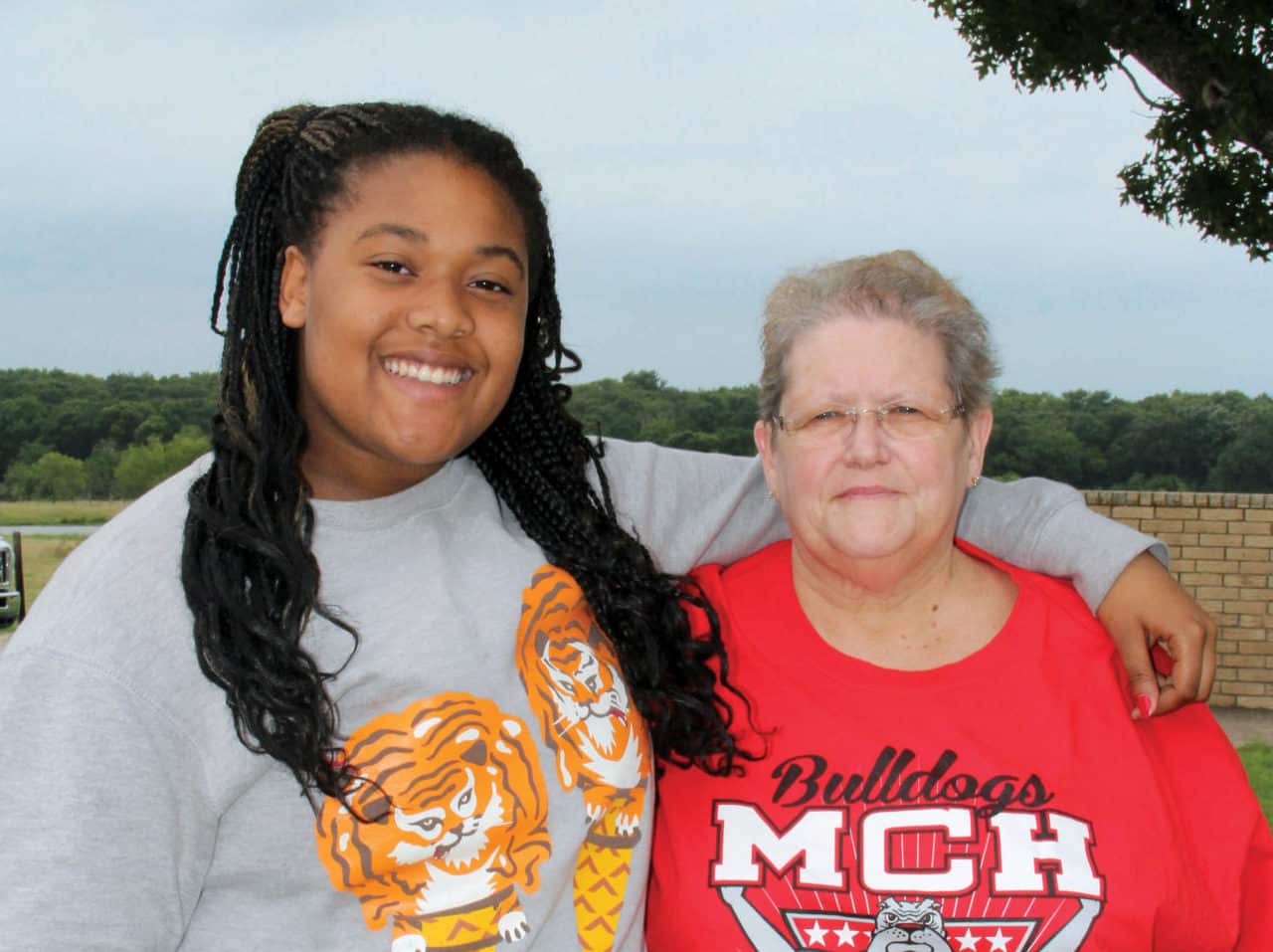
“In this job, you may never think that you made a connection,” Debbie said. “But then a child calls and that’s when you know you’re accomplishing something. Some of the toughest girls are the ones you hear from the most and talk to the most after they leave.
“It’s an emotionally challenging job,” she said. “I like to fix things and I get emotionally attached and take on a lot of the hurt. But the relationships I’ve made, I wouldn’t trade them.”
“There’s been days I’ve wanted to quit and days she’s wanted to quit,” Steve admitted. “But then you go home and you think about it and you’ve just got to come back. The kids keep us here. I can’t imagine not coming back here every seven days. This is probably the best job I have ever had.”
Leave a Reply